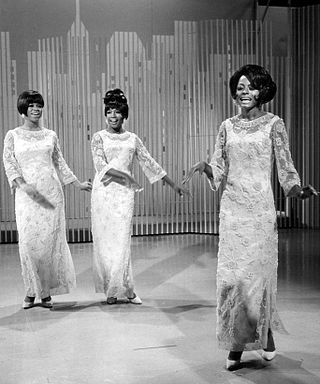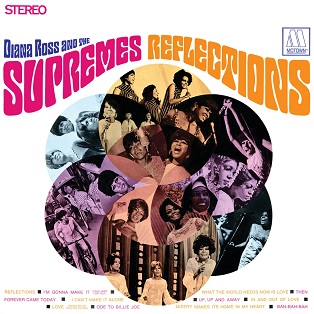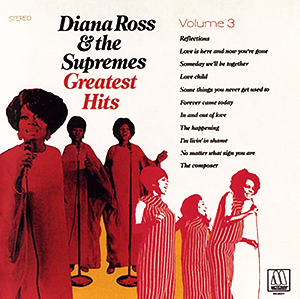
The Supremes were an American girl group formed in Detroit, Michigan in 1959 as the Primettes. A premier act of Motown Records during the 1960s, the Supremes were the most commercially successful of Motown's acts and the most successful American vocal band, with 12 number-one singles on the Billboard Hot 100. Most of these hits were written and produced by Motown's main songwriting and production team, Holland–Dozier–Holland. Their breakthrough is considered to have made it possible for future African-American R&B and soul musicians to find mainstream success. Billboard ranked the Supremes as the 16th greatest Hot 100 artist of all time.

Mary Wilson was an American singer. She gained worldwide recognition as a founding member of the Supremes, the most successful Motown act of the 1960s and the best-charting female group in U.S. chart history, as well as one of the best-selling girl groups of all-time. The trio reached number one on Billboard's Hot 100 with 12 of their singles, ten of which feature Wilson on backing vocals.
"Someday We'll Be Together" is a song written by Johnny Bristol, Jackey Beavers, and Harvey Fuqua. It was the last of twelve American number-one pop singles for Diana Ross & the Supremes on the Motown label. Although it was released as the final Supremes song featuring Diana Ross, who left the group for a solo career in January 1970, it was recorded as Ross' first solo single and Supremes members Mary Wilson and Cindy Birdsong do not sing on the recording. Both appear on the B-side, "He's My Sunny Boy".

Motown 25: Yesterday, Today, Forever is a 1983 television special, produced by Suzanne de Passe for Motown, to commemorate its 25th anniversary. The program was taped before a live audience at the Pasadena Civic Auditorium in Pasadena, California on March 25, 1983, and broadcast on NBC on May 16. Among its highlights were Michael Jackson's performance of "Billie Jean", Smokey Robinson's reunion with the Miracles, a Temptations / Four Tops "battle of the bands", Marvin Gaye's inspired speech about black music history and his memorable performance of "What's Going On", a Jackson 5 reunion, and an abbreviated reunion of Diana Ross & the Supremes, who performed their final #1 hit, "Someday We'll Be Together" from 1969. The show was written by Buz Kohan, Ruth Robinson, and de Passe. The broadcast was watched by over 47 million viewers.

Let The Sunshine In is the sixteenth studio album by Diana Ross & the Supremes recorded and released by Motown in 1969. It contains the hit single "I'm Livin' in Shame", "The Composer," a Smokey Robinson composition that peaked at number 27, and "No Matter What Sign You Are," - a single produced by Motown chief Berry Gordy that failed to crack to Top 30. Motown had titled the album “No Matter What Sign You Are” originally; going as far as creating the front cover art with the title in it, but when the single didn’t chart as expected the album was retitled “Let The Sunshine In.” Though the album was released when the group consisted of Diana Ross, Mary Wilson and Cindy Birdsong, original founding member Florence Ballard appears on two songs.

Reflections is the twelfth studio album recorded for Motown by Diana Ross & the Supremes. Released in 1968, it was the first regular studio LP to display the new billing of the group formerly known as "The Supremes." It contains the singles "Reflections", "In and Out of Love" and "Forever Came Today". Also included are covers of songs made famous by Martha and the Vandellas and The 5th Dimension. Also present are songs written by other famous names, including "Bah-Bah-Bah" co-written by Motown singer Brenda Holloway with her younger sister, Patrice, an original Smokey Robinson composition titled "Then", and "What the World Needs Now Is Love" by Burt Bacharach and Hal David, which Motown planned to release as a single in the spring of 1968, but cancelled. It also contains a cover of Bobbie Gentry's "Ode to Billie Joe," whose original recording kept the single #2 "Reflections" from peaking at the top spot on the Billboard Hot 100 in September 1967, and it hit #2 on Cashbox.

Where Did Our Love Go is the second studio album by Motown singing group the Supremes, released in 1964. The album includes several of the group's singles and B-sides from 1963 and 1964. Included are the group's first Billboard Pop Singles number-one hits, "Where Did Our Love Go", "Baby Love", and "Come See About Me", as well as their first Top 40 hit, "When the Lovelight Starts Shining Through His Eyes", and the singles "A Breathtaking Guy" and "Run, Run, Run".

Meet the Supremes is the debut studio album by The Supremes, released in late 1962 on Motown.

The Supremes at the Copa is a live album by the Motown singing group the Supremes, recorded during their debut engagement at the prestigious Copacabana nightclub in New York City. Released in the late fall of 1965, At the Copa was the first live album issued by the Supremes, and the only live album issued by the group's best-known lineup of Diana Ross, Florence Ballard and Mary Wilson.

Diana Ross & the Supremes: Greatest Hits Vol. 3 is a 1969 compilation album by Diana Ross & the Supremes, released on the Motown label. It features all of the hits released by the group between 1967 and 1969 save for the Supremes/Temptations duet singles. After Florence Ballard's mid-1967 departure from the group, Supremes singles were recorded by Diana Ross with session singers The Andantes on backgrounds instead of new Supreme Cindy Birdsong and founding member Mary Wilson, including "Love Child" and "Someday We'll Be Together".

"Your Heart Belongs to Me" is a 1962 song written and composed by The Miracles' William "Smokey" Robinson and released as a single by Motown singing group The Supremes during their early years with the label. The song is about a woman whose lover is in the armed forces and has "Gone to a far-away land"; its narration has her tell him to always remember their love for each other if he ever gets lonely.
"Let Me Go the Right Way" is a 1962 song written and produced by then Motown president Berry Gordy and released as a single by Motown singing group The Supremes. It was the group's fourth single and their second charted record following the dismal reception of their first charted single, "Your Heart Belongs to Me".

"When the Lovelight Starts Shining Through His Eyes" is a song written by Holland–Dozier–Holland and recorded in 1963 by the Motown singing group the Supremes. It is notable as the Supremes' first Billboard Hot 100 Top 40 recording, following seven previous singles between January 1961 and September 1963 which failed to enter the Top 40. The single is also notable as the first Supremes single written and produced by Holland–Dozier–Holland, who had previously created hits for Martha and the Vandellas and Mary Wells.
"Mickey's Monkey" is a 1963 song recorded by the R&B group the Miracles on Motown Records' Tamla label. It was written and produced by Motown's main songwriting team of Brian Holland, Lamont Dozier, and Eddie Holland, who later went on to write two more Miracles hit singles, the Top 40 "I Gotta Dance to Keep From Crying", and the Top 20 "(Come 'Round Here) I'm The One You Need". This was an unusual writing situation for the Miracles, as most of their songs were generally composed by the group members themselves.
"My Heart Can't Take It No More" is a 1963 song recorded by The Supremes for the Motown label. Written and produced by Clarence Paul, "My Heart Can't Take It No More" charted at 29 on the Billboard Bubbling Under Hot 100 Singles chart. The group would not miss charting a single again on the Billboard Hot 100 chart for another 12 years.
"I Want a Guy" is a song written by Freddie Gorman, Berry Gordy and Brian Holland and was the debuting single for Motown girl group The Supremes in 1961. It was also recorded by The Marvelettes on their album Please Mr. Postman. Featuring Diana Ross in lead, the song was a doo-wop ballad similar to what the Supremes had been recording since forming as "The Primettes" two years earlier.

"I'll Try Something New" is a song written by Smokey Robinson and originally released in 1962 by The Miracles on Motown Records' Tamla subsidiary label. Their version was a Billboard Top 40 hit, peaking at #39, and just missed the Top 10 of its R&B chart, peaking at #11. The song was released later as a joint single by Diana Ross & the Supremes and The Temptations, also becoming a charting version on the Billboard 100 pop singles chart, peaking for two weeks in April 1969 at number 25.
"After All" is a 1960 song written by Smokey Robinson and originally recorded and released by The Miracles on the Tamla label. It was first recorded as an unreleased single by The Supremes for Tamla; it was supposed to be their first single but it was canceled in favor of "I Want a Guy", and their cover wasn't released until it appeared on the 2000 box set, The Supremes. The song is noted for both groups' unusual choices for leads. For the Miracles' version it serves as a rare lead for Claudette Rogers Robinson, instead of the group’s main lead, Claudette's husband, Smokey Robinson. In the Supremes' case it is their only single to feature Barbara Martin singing on lead vocals. Florence Ballard, Mary Wilson, and Diana Ross sing verses, and Martin sings the bridge. "After All" was also later covered by The Marvelettes, in the early 1970s, with group member Wanda Young Rogers as lead. Their version appears on the album The Return of the Marvelettes, and later became the group's belated final single.

"Where Did Our Love Go" is a 1964 song recorded by American music group the Supremes for the Motown label.
"Too Hurt to Cry, Too Much in Love to Say Goodbye" is a 1963 song and single written and composed by Motown's main production team Holland–Dozier–Holland. Credited to the Darnells, the performers on both sides of the single were the Andantes, Holland–Dozier–Holland, Mary Wilson of the Supremes (B-side), and members of the Marvelettes, the Four Tops, and the Temptations. Nobody involved with the production on either side was pleased with the false credit. The single peaked at number 17 on the Billboard Bubbling Under Hot 100 chart.












